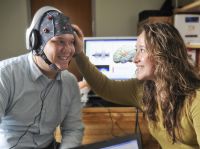November 27th, 2019, 10:00 - 12:00
10:00 - 12:00 val. VUL Santaros klinikų Raudonojoje auditorijoje (Santariškių g. 2, Vilnius).
„Galvos smegenų-kompiuterio sąsajos: šiuometinė padėtis ir panaudojimas klinikoje“(angl. Brain-Machine Interfaces (BMIs): Current State and Clinical Application)
In this lecture, Dr. Korostenskaja will share her knowledge about the most recent developments in BMI research with particular emphasis on clinical BMI application.
Research groups all over the world are working on the direct connection between the human brain and a computer, a so-called Brain-Machine Interface (BMI). It is a device that records, analyzes, and translates the user’s brain activity into various command signals, thus allowing the direct communication between the brain and devices, bypassing muscle activity. BMIs can be used to replace, restore, enhance, supplement, and improve body functions.
The best BMI control can be achieved when using brain imaging methodologies that have a superior temporal resolution (millisecond scale). These include magnetoencephalography (MEG), electroencephalography (EEG), and electrocorticography (ECoG).
Main current clinical BMI applications include functional brain mapping (e.g., to prevent functional morbidity after epilepsy and brain tumor surgeries); communication (e.g., patients with amyotrophic lateral sclerosis – ALS); consciousness detection (e.g., patients with disorders of consciousness - DOC); prosthetics (e.g., lost limb replacement and control) and rehabilitation (e.g., improving motor function, especially in patients status post-stroke). Dr. Korostenskaja will conclude her presentation with the critical appraisal of the current status of BCI development and provide a view on the future perspectives regarding the successful BCI implementation.
Milena Korostenskaja, Ph.D. Head of Functional Brain Mapping and Brain-Computer Interface Program, Neuroscience Institute, AdventHealth Orlando, Florida, USA.
e-mail: milena.korostenskaja@adventhealth.com
About the speaker:
Dr. Milena Korostenskaja leads the Functional Brain Mapping and Brain-Computer Interface Program at the Neuroscience Institute, AdventHealth Orlando. Currently, she is working closely with the Epilepsy Center at AdventHealth Orlando to help guide epilepsy surgery by creating individual functional brain maps for surgical candidates. Dr. Korostenskaja’s main goal is to establish the Adaptive Neurotechnology Clinic, where the latest innovations in the field of brain-computer interfaces (BCIs) will be utilized to improve patient’s diagnosis, treatment, and quality of life.
Dr. Korostenskaja received her Bachelor’s degree in Biochemistry, a Master’s degree in Neurobiology, and PhD in Biomedical Sciences (Biophysics) from Vilnius University. She studied at Helsinki University to earn a doctoral degree in Behavioral Sciences (Psychology). Prior to joining AdventHealth Orlando, Dr. Korostenskaja worked on clinical applications of her research in patients with mental illnesses and neurological disorders at different clinical sites, such as the Department of Electrophysiological Investigations at Republican Vilnius Psychiatric Hospital in Vilnius, Lithuania; BioMag Laboratory, Helsinki University Central Hospital in Helsinki, Finland; and the Department of Neurology, Cincinnati Children's Hospital in Cincinnati, Ohio, USA.
Dr. Korostenskaja has extensive experience with functional imaging methodologies, such as electroencephalography (EEG), magnetoencephalography (MEG), electrocorticography (ECoG), as well as with brain-computer interfacing (BCI). She has authored and co-authored over 50 scientific peer-reviewed publications and book chapters. Dr. Korostenskaja is often invited to share her knowledge and expertise in the field, which has resulted in more than 70 talks at the scientific venues and educational events both within the USA and internationally.
Also, Dr. Korostenskaja enjoys mentoring students on their research projects and teaching research- and neuroscience-related courses, such as Research Methods, Behavioral Neuroscience, Human Sensory Perception, Adaptive Neurotechnologies, and others. She is affiliated with several academic institutions, including Vilnius University, University of North Florida, and AdventHealth University. Dr. Korostenskaja serves as a member on dissertation defense committees, scientific review committees, grant review and award committees (for example, International Brain-Computer Interface Award committee, Brain Hackathon Award committee, and others).


